Taxation Law: Analysis of Capital Gains, Deductions, and Tax Return
VerifiedAdded on 2023/01/13
|10
|2626
|21
Report
AI Summary
This report provides a detailed analysis of Australian taxation law, focusing on capital gains tax (CGT) and allowable deductions. The introduction provides an overview of the Australian taxation system, emphasizing the roles of the Australian Taxation Office (ATO) and the federal government. The report then delves into the specifics of CGT, explaining how it applies to the sale of various assets, including land, shares, and collectibles, and the implications of capital losses. The second part of the report explores various deductions, differentiating between work-related and private expenses, with examples such as travel, uniforms, childcare, and phone calls. The report references the Income Tax Assessment Act 1936 (ITAA 1936) and the Income Tax Assessment Act 1997 (ITAA 1997) throughout its analysis, offering a comprehensive overview of the relevant tax provisions and their practical application. The report concludes by summarizing the key findings and implications for taxpayers in Australia.
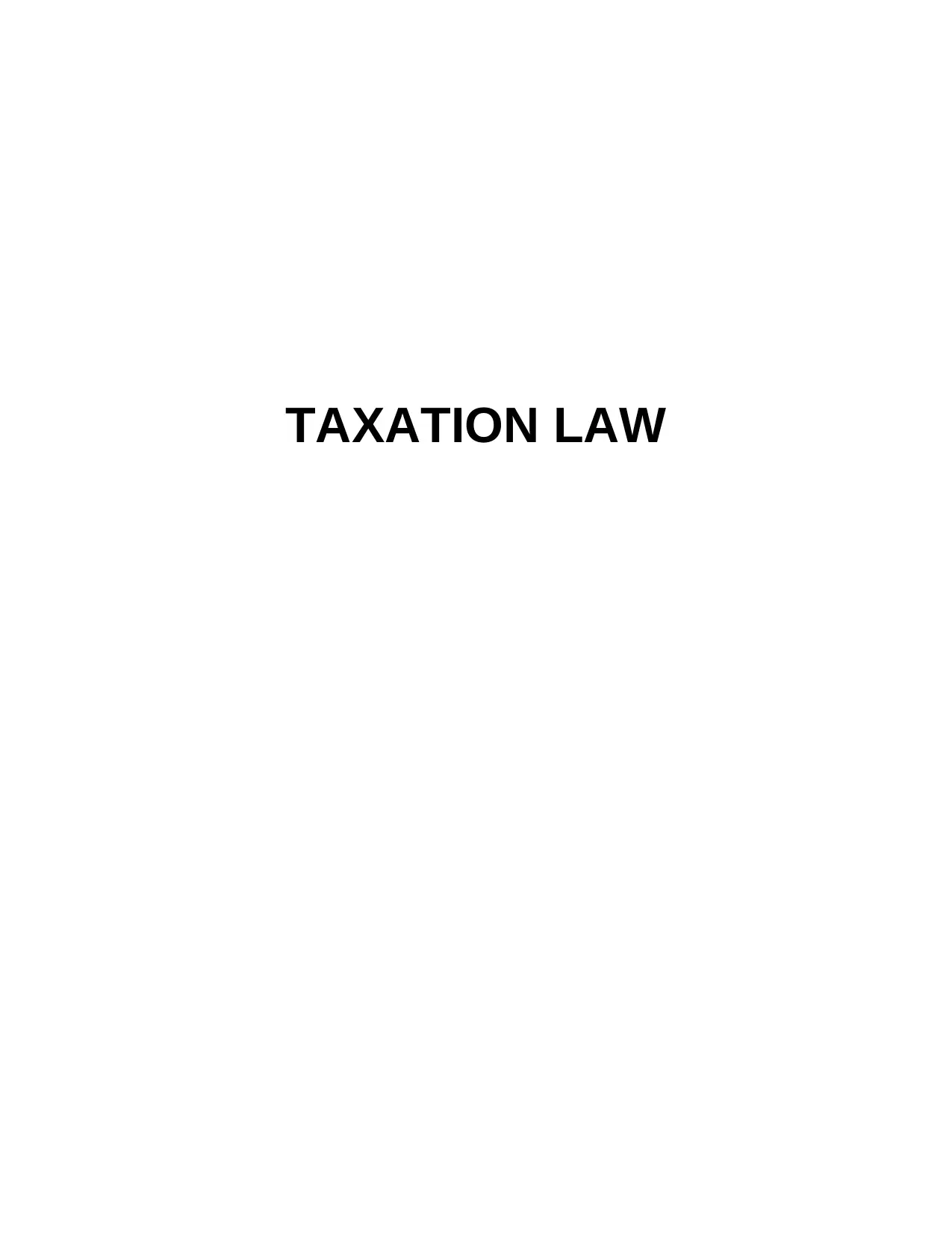
TAXATION LAW
Paraphrase This Document
Need a fresh take? Get an instant paraphrase of this document with our AI Paraphraser
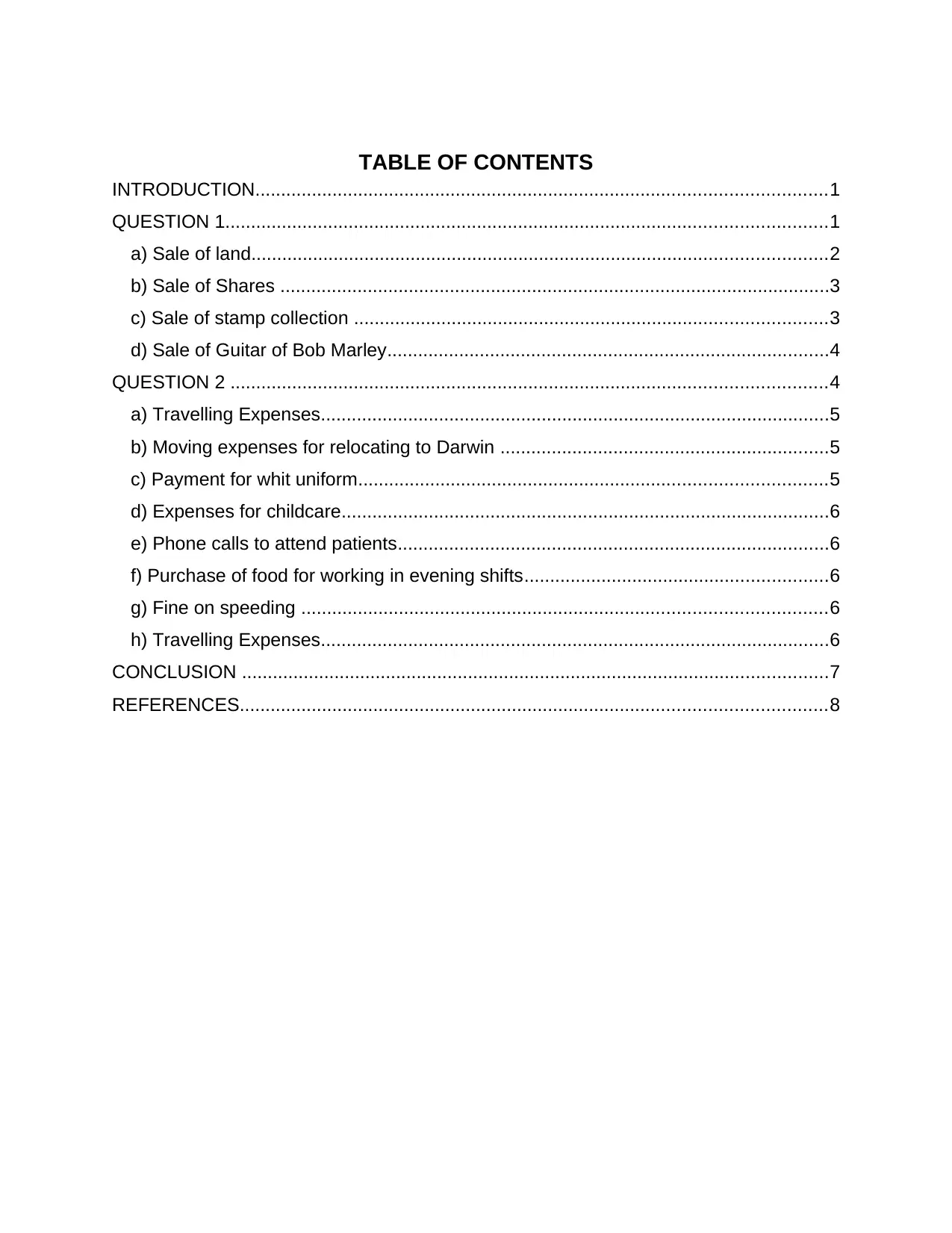
TABLE OF CONTENTS
INTRODUCTION...............................................................................................................1
QUESTION 1.....................................................................................................................1
a) Sale of land................................................................................................................2
b) Sale of Shares ...........................................................................................................3
c) Sale of stamp collection ............................................................................................3
d) Sale of Guitar of Bob Marley......................................................................................4
QUESTION 2 ....................................................................................................................4
a) Travelling Expenses...................................................................................................5
b) Moving expenses for relocating to Darwin ................................................................5
c) Payment for whit uniform...........................................................................................5
d) Expenses for childcare...............................................................................................6
e) Phone calls to attend patients....................................................................................6
f) Purchase of food for working in evening shifts...........................................................6
g) Fine on speeding ......................................................................................................6
h) Travelling Expenses...................................................................................................6
CONCLUSION ..................................................................................................................7
REFERENCES..................................................................................................................8
INTRODUCTION...............................................................................................................1
QUESTION 1.....................................................................................................................1
a) Sale of land................................................................................................................2
b) Sale of Shares ...........................................................................................................3
c) Sale of stamp collection ............................................................................................3
d) Sale of Guitar of Bob Marley......................................................................................4
QUESTION 2 ....................................................................................................................4
a) Travelling Expenses...................................................................................................5
b) Moving expenses for relocating to Darwin ................................................................5
c) Payment for whit uniform...........................................................................................5
d) Expenses for childcare...............................................................................................6
e) Phone calls to attend patients....................................................................................6
f) Purchase of food for working in evening shifts...........................................................6
g) Fine on speeding ......................................................................................................6
h) Travelling Expenses...................................................................................................6
CONCLUSION ..................................................................................................................7
REFERENCES..................................................................................................................8
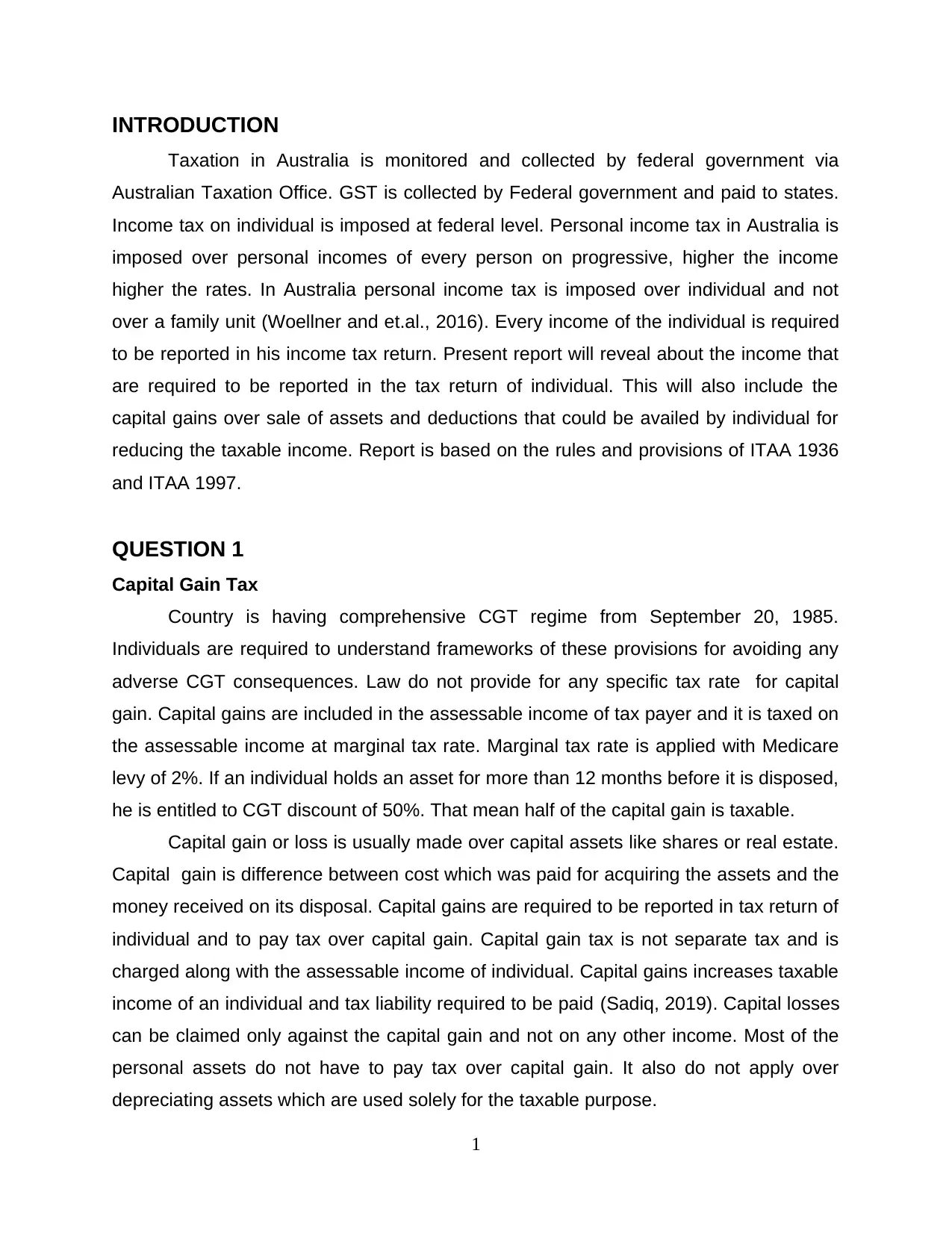
INTRODUCTION
Taxation in Australia is monitored and collected by federal government via
Australian Taxation Office. GST is collected by Federal government and paid to states.
Income tax on individual is imposed at federal level. Personal income tax in Australia is
imposed over personal incomes of every person on progressive, higher the income
higher the rates. In Australia personal income tax is imposed over individual and not
over a family unit (Woellner and et.al., 2016). Every income of the individual is required
to be reported in his income tax return. Present report will reveal about the income that
are required to be reported in the tax return of individual. This will also include the
capital gains over sale of assets and deductions that could be availed by individual for
reducing the taxable income. Report is based on the rules and provisions of ITAA 1936
and ITAA 1997.
QUESTION 1
Capital Gain Tax
Country is having comprehensive CGT regime from September 20, 1985.
Individuals are required to understand frameworks of these provisions for avoiding any
adverse CGT consequences. Law do not provide for any specific tax rate for capital
gain. Capital gains are included in the assessable income of tax payer and it is taxed on
the assessable income at marginal tax rate. Marginal tax rate is applied with Medicare
levy of 2%. If an individual holds an asset for more than 12 months before it is disposed,
he is entitled to CGT discount of 50%. That mean half of the capital gain is taxable.
Capital gain or loss is usually made over capital assets like shares or real estate.
Capital gain is difference between cost which was paid for acquiring the assets and the
money received on its disposal. Capital gains are required to be reported in tax return of
individual and to pay tax over capital gain. Capital gain tax is not separate tax and is
charged along with the assessable income of individual. Capital gains increases taxable
income of an individual and tax liability required to be paid (Sadiq, 2019). Capital losses
can be claimed only against the capital gain and not on any other income. Most of the
personal assets do not have to pay tax over capital gain. It also do not apply over
depreciating assets which are used solely for the taxable purpose.
1
Taxation in Australia is monitored and collected by federal government via
Australian Taxation Office. GST is collected by Federal government and paid to states.
Income tax on individual is imposed at federal level. Personal income tax in Australia is
imposed over personal incomes of every person on progressive, higher the income
higher the rates. In Australia personal income tax is imposed over individual and not
over a family unit (Woellner and et.al., 2016). Every income of the individual is required
to be reported in his income tax return. Present report will reveal about the income that
are required to be reported in the tax return of individual. This will also include the
capital gains over sale of assets and deductions that could be availed by individual for
reducing the taxable income. Report is based on the rules and provisions of ITAA 1936
and ITAA 1997.
QUESTION 1
Capital Gain Tax
Country is having comprehensive CGT regime from September 20, 1985.
Individuals are required to understand frameworks of these provisions for avoiding any
adverse CGT consequences. Law do not provide for any specific tax rate for capital
gain. Capital gains are included in the assessable income of tax payer and it is taxed on
the assessable income at marginal tax rate. Marginal tax rate is applied with Medicare
levy of 2%. If an individual holds an asset for more than 12 months before it is disposed,
he is entitled to CGT discount of 50%. That mean half of the capital gain is taxable.
Capital gain or loss is usually made over capital assets like shares or real estate.
Capital gain is difference between cost which was paid for acquiring the assets and the
money received on its disposal. Capital gains are required to be reported in tax return of
individual and to pay tax over capital gain. Capital gain tax is not separate tax and is
charged along with the assessable income of individual. Capital gains increases taxable
income of an individual and tax liability required to be paid (Sadiq, 2019). Capital losses
can be claimed only against the capital gain and not on any other income. Most of the
personal assets do not have to pay tax over capital gain. It also do not apply over
depreciating assets which are used solely for the taxable purpose.
1
⊘ This is a preview!⊘
Do you want full access?
Subscribe today to unlock all pages.

Trusted by 1+ million students worldwide
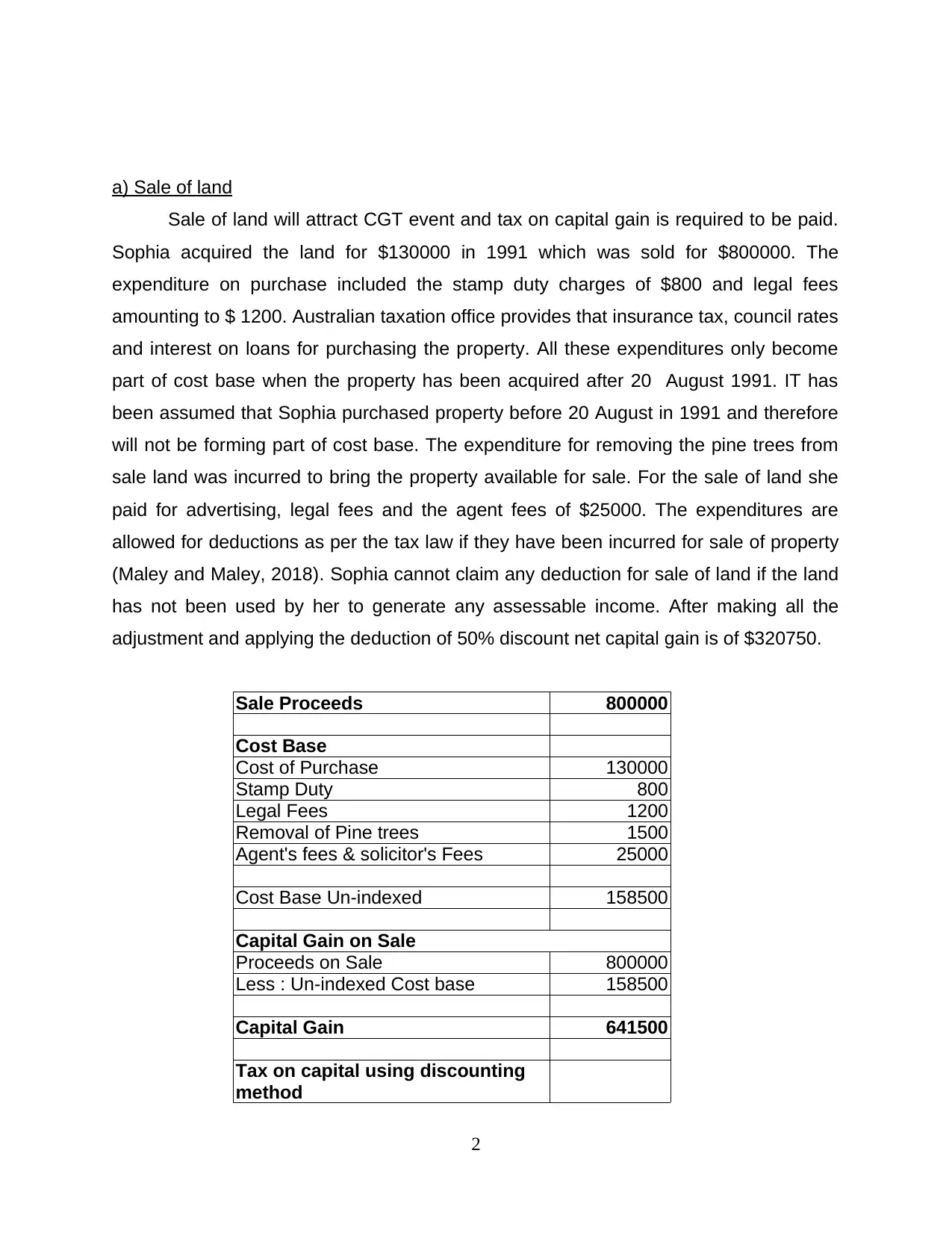
a) Sale of land
Sale of land will attract CGT event and tax on capital gain is required to be paid.
Sophia acquired the land for $130000 in 1991 which was sold for $800000. The
expenditure on purchase included the stamp duty charges of $800 and legal fees
amounting to $ 1200. Australian taxation office provides that insurance tax, council rates
and interest on loans for purchasing the property. All these expenditures only become
part of cost base when the property has been acquired after 20 August 1991. IT has
been assumed that Sophia purchased property before 20 August in 1991 and therefore
will not be forming part of cost base. The expenditure for removing the pine trees from
sale land was incurred to bring the property available for sale. For the sale of land she
paid for advertising, legal fees and the agent fees of $25000. The expenditures are
allowed for deductions as per the tax law if they have been incurred for sale of property
(Maley and Maley, 2018). Sophia cannot claim any deduction for sale of land if the land
has not been used by her to generate any assessable income. After making all the
adjustment and applying the deduction of 50% discount net capital gain is of $320750.
Sale Proceeds 800000
Cost Base
Cost of Purchase 130000
Stamp Duty 800
Legal Fees 1200
Removal of Pine trees 1500
Agent's fees & solicitor's Fees 25000
Cost Base Un-indexed 158500
Capital Gain on Sale
Proceeds on Sale 800000
Less : Un-indexed Cost base 158500
Capital Gain 641500
Tax on capital using discounting
method
2
Sale of land will attract CGT event and tax on capital gain is required to be paid.
Sophia acquired the land for $130000 in 1991 which was sold for $800000. The
expenditure on purchase included the stamp duty charges of $800 and legal fees
amounting to $ 1200. Australian taxation office provides that insurance tax, council rates
and interest on loans for purchasing the property. All these expenditures only become
part of cost base when the property has been acquired after 20 August 1991. IT has
been assumed that Sophia purchased property before 20 August in 1991 and therefore
will not be forming part of cost base. The expenditure for removing the pine trees from
sale land was incurred to bring the property available for sale. For the sale of land she
paid for advertising, legal fees and the agent fees of $25000. The expenditures are
allowed for deductions as per the tax law if they have been incurred for sale of property
(Maley and Maley, 2018). Sophia cannot claim any deduction for sale of land if the land
has not been used by her to generate any assessable income. After making all the
adjustment and applying the deduction of 50% discount net capital gain is of $320750.
Sale Proceeds 800000
Cost Base
Cost of Purchase 130000
Stamp Duty 800
Legal Fees 1200
Removal of Pine trees 1500
Agent's fees & solicitor's Fees 25000
Cost Base Un-indexed 158500
Capital Gain on Sale
Proceeds on Sale 800000
Less : Un-indexed Cost base 158500
Capital Gain 641500
Tax on capital using discounting
method
2
Paraphrase This Document
Need a fresh take? Get an instant paraphrase of this document with our AI Paraphraser
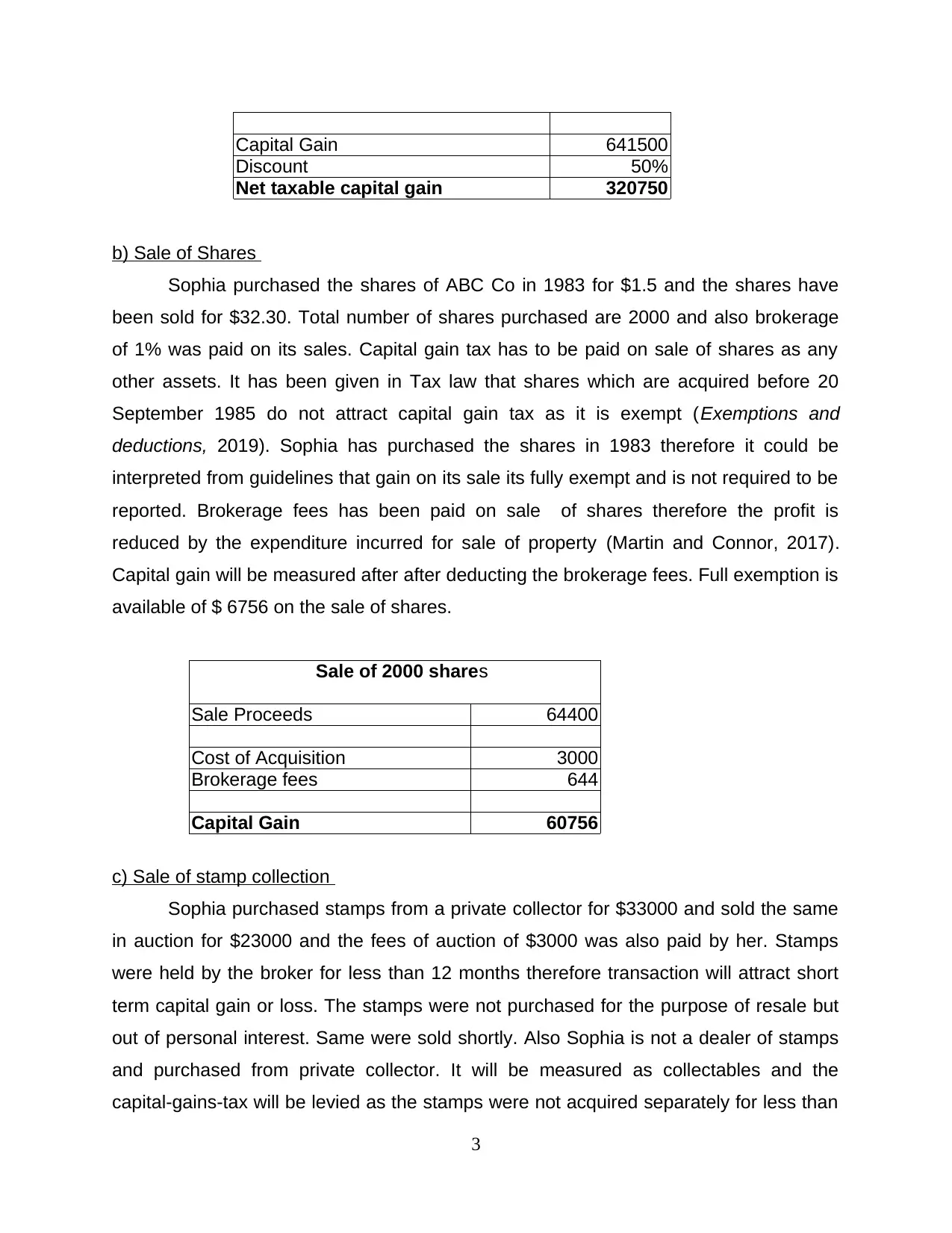
Capital Gain 641500
Discount 50%
Net taxable capital gain 320750
b) Sale of Shares
Sophia purchased the shares of ABC Co in 1983 for $1.5 and the shares have
been sold for $32.30. Total number of shares purchased are 2000 and also brokerage
of 1% was paid on its sales. Capital gain tax has to be paid on sale of shares as any
other assets. It has been given in Tax law that shares which are acquired before 20
September 1985 do not attract capital gain tax as it is exempt (Exemptions and
deductions, 2019). Sophia has purchased the shares in 1983 therefore it could be
interpreted from guidelines that gain on its sale its fully exempt and is not required to be
reported. Brokerage fees has been paid on sale of shares therefore the profit is
reduced by the expenditure incurred for sale of property (Martin and Connor, 2017).
Capital gain will be measured after after deducting the brokerage fees. Full exemption is
available of $ 6756 on the sale of shares.
Sale of 2000 shares
Sale Proceeds 64400
Cost of Acquisition 3000
Brokerage fees 644
Capital Gain 60756
c) Sale of stamp collection
Sophia purchased stamps from a private collector for $33000 and sold the same
in auction for $23000 and the fees of auction of $3000 was also paid by her. Stamps
were held by the broker for less than 12 months therefore transaction will attract short
term capital gain or loss. The stamps were not purchased for the purpose of resale but
out of personal interest. Same were sold shortly. Also Sophia is not a dealer of stamps
and purchased from private collector. It will be measured as collectables and the
capital-gains-tax will be levied as the stamps were not acquired separately for less than
3
Discount 50%
Net taxable capital gain 320750
b) Sale of Shares
Sophia purchased the shares of ABC Co in 1983 for $1.5 and the shares have
been sold for $32.30. Total number of shares purchased are 2000 and also brokerage
of 1% was paid on its sales. Capital gain tax has to be paid on sale of shares as any
other assets. It has been given in Tax law that shares which are acquired before 20
September 1985 do not attract capital gain tax as it is exempt (Exemptions and
deductions, 2019). Sophia has purchased the shares in 1983 therefore it could be
interpreted from guidelines that gain on its sale its fully exempt and is not required to be
reported. Brokerage fees has been paid on sale of shares therefore the profit is
reduced by the expenditure incurred for sale of property (Martin and Connor, 2017).
Capital gain will be measured after after deducting the brokerage fees. Full exemption is
available of $ 6756 on the sale of shares.
Sale of 2000 shares
Sale Proceeds 64400
Cost of Acquisition 3000
Brokerage fees 644
Capital Gain 60756
c) Sale of stamp collection
Sophia purchased stamps from a private collector for $33000 and sold the same
in auction for $23000 and the fees of auction of $3000 was also paid by her. Stamps
were held by the broker for less than 12 months therefore transaction will attract short
term capital gain or loss. The stamps were not purchased for the purpose of resale but
out of personal interest. Same were sold shortly. Also Sophia is not a dealer of stamps
and purchased from private collector. It will be measured as collectables and the
capital-gains-tax will be levied as the stamps were not acquired separately for less than
3
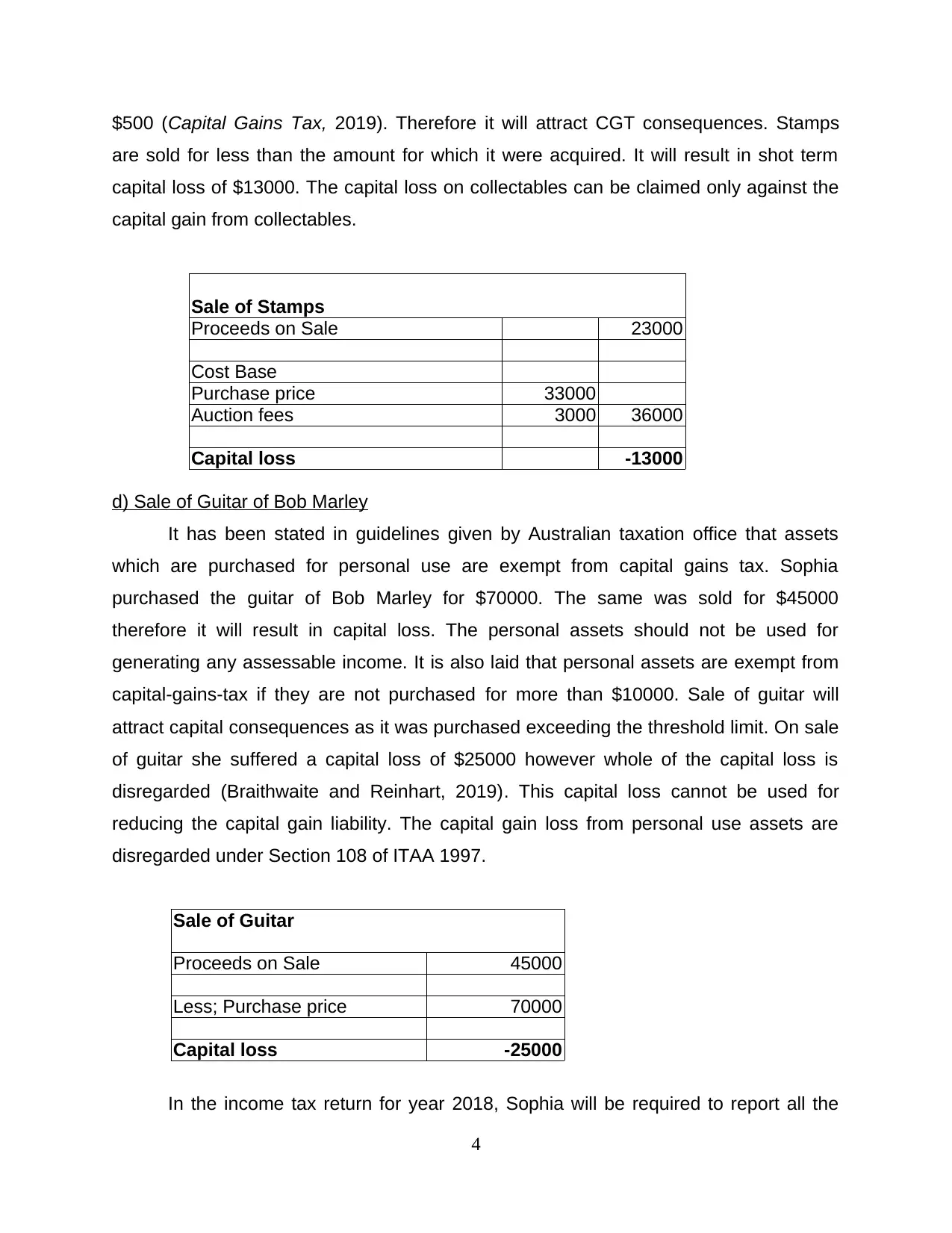
$500 (Capital Gains Tax, 2019). Therefore it will attract CGT consequences. Stamps
are sold for less than the amount for which it were acquired. It will result in shot term
capital loss of $13000. The capital loss on collectables can be claimed only against the
capital gain from collectables.
Sale of Stamps
Proceeds on Sale 23000
Cost Base
Purchase price 33000
Auction fees 3000 36000
Capital loss -13000
d) Sale of Guitar of Bob Marley
It has been stated in guidelines given by Australian taxation office that assets
which are purchased for personal use are exempt from capital gains tax. Sophia
purchased the guitar of Bob Marley for $70000. The same was sold for $45000
therefore it will result in capital loss. The personal assets should not be used for
generating any assessable income. It is also laid that personal assets are exempt from
capital-gains-tax if they are not purchased for more than $10000. Sale of guitar will
attract capital consequences as it was purchased exceeding the threshold limit. On sale
of guitar she suffered a capital loss of $25000 however whole of the capital loss is
disregarded (Braithwaite and Reinhart, 2019). This capital loss cannot be used for
reducing the capital gain liability. The capital gain loss from personal use assets are
disregarded under Section 108 of ITAA 1997.
Sale of Guitar
Proceeds on Sale 45000
Less; Purchase price 70000
Capital loss -25000
In the income tax return for year 2018, Sophia will be required to report all the
4
are sold for less than the amount for which it were acquired. It will result in shot term
capital loss of $13000. The capital loss on collectables can be claimed only against the
capital gain from collectables.
Sale of Stamps
Proceeds on Sale 23000
Cost Base
Purchase price 33000
Auction fees 3000 36000
Capital loss -13000
d) Sale of Guitar of Bob Marley
It has been stated in guidelines given by Australian taxation office that assets
which are purchased for personal use are exempt from capital gains tax. Sophia
purchased the guitar of Bob Marley for $70000. The same was sold for $45000
therefore it will result in capital loss. The personal assets should not be used for
generating any assessable income. It is also laid that personal assets are exempt from
capital-gains-tax if they are not purchased for more than $10000. Sale of guitar will
attract capital consequences as it was purchased exceeding the threshold limit. On sale
of guitar she suffered a capital loss of $25000 however whole of the capital loss is
disregarded (Braithwaite and Reinhart, 2019). This capital loss cannot be used for
reducing the capital gain liability. The capital gain loss from personal use assets are
disregarded under Section 108 of ITAA 1997.
Sale of Guitar
Proceeds on Sale 45000
Less; Purchase price 70000
Capital loss -25000
In the income tax return for year 2018, Sophia will be required to report all the
4
⊘ This is a preview!⊘
Do you want full access?
Subscribe today to unlock all pages.

Trusted by 1+ million students worldwide
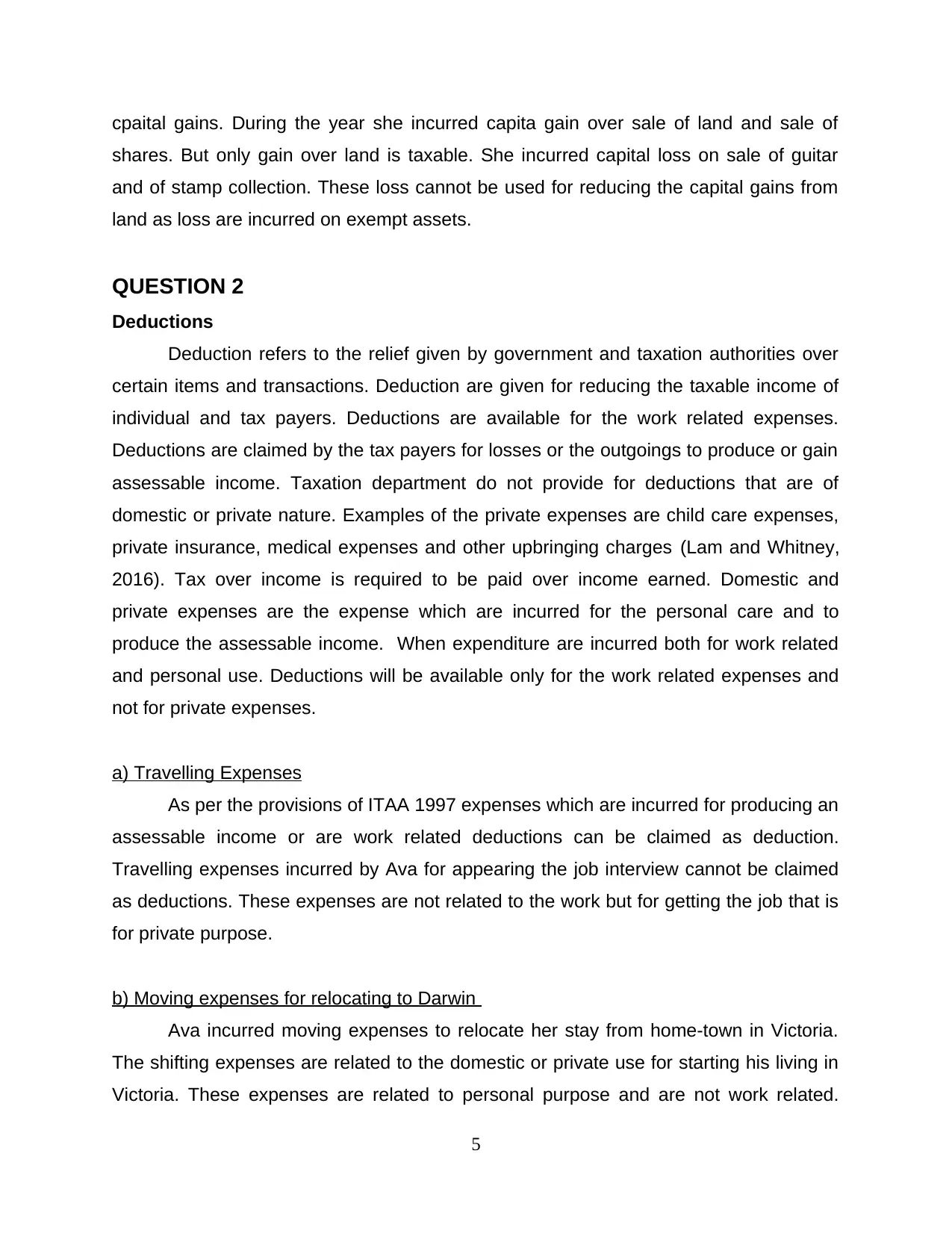
cpaital gains. During the year she incurred capita gain over sale of land and sale of
shares. But only gain over land is taxable. She incurred capital loss on sale of guitar
and of stamp collection. These loss cannot be used for reducing the capital gains from
land as loss are incurred on exempt assets.
QUESTION 2
Deductions
Deduction refers to the relief given by government and taxation authorities over
certain items and transactions. Deduction are given for reducing the taxable income of
individual and tax payers. Deductions are available for the work related expenses.
Deductions are claimed by the tax payers for losses or the outgoings to produce or gain
assessable income. Taxation department do not provide for deductions that are of
domestic or private nature. Examples of the private expenses are child care expenses,
private insurance, medical expenses and other upbringing charges (Lam and Whitney,
2016). Tax over income is required to be paid over income earned. Domestic and
private expenses are the expense which are incurred for the personal care and to
produce the assessable income. When expenditure are incurred both for work related
and personal use. Deductions will be available only for the work related expenses and
not for private expenses.
a) Travelling Expenses
As per the provisions of ITAA 1997 expenses which are incurred for producing an
assessable income or are work related deductions can be claimed as deduction.
Travelling expenses incurred by Ava for appearing the job interview cannot be claimed
as deductions. These expenses are not related to the work but for getting the job that is
for private purpose.
b) Moving expenses for relocating to Darwin
Ava incurred moving expenses to relocate her stay from home-town in Victoria.
The shifting expenses are related to the domestic or private use for starting his living in
Victoria. These expenses are related to personal purpose and are not work related.
5
shares. But only gain over land is taxable. She incurred capital loss on sale of guitar
and of stamp collection. These loss cannot be used for reducing the capital gains from
land as loss are incurred on exempt assets.
QUESTION 2
Deductions
Deduction refers to the relief given by government and taxation authorities over
certain items and transactions. Deduction are given for reducing the taxable income of
individual and tax payers. Deductions are available for the work related expenses.
Deductions are claimed by the tax payers for losses or the outgoings to produce or gain
assessable income. Taxation department do not provide for deductions that are of
domestic or private nature. Examples of the private expenses are child care expenses,
private insurance, medical expenses and other upbringing charges (Lam and Whitney,
2016). Tax over income is required to be paid over income earned. Domestic and
private expenses are the expense which are incurred for the personal care and to
produce the assessable income. When expenditure are incurred both for work related
and personal use. Deductions will be available only for the work related expenses and
not for private expenses.
a) Travelling Expenses
As per the provisions of ITAA 1997 expenses which are incurred for producing an
assessable income or are work related deductions can be claimed as deduction.
Travelling expenses incurred by Ava for appearing the job interview cannot be claimed
as deductions. These expenses are not related to the work but for getting the job that is
for private purpose.
b) Moving expenses for relocating to Darwin
Ava incurred moving expenses to relocate her stay from home-town in Victoria.
The shifting expenses are related to the domestic or private use for starting his living in
Victoria. These expenses are related to personal purpose and are not work related.
5
Paraphrase This Document
Need a fresh take? Get an instant paraphrase of this document with our AI Paraphraser
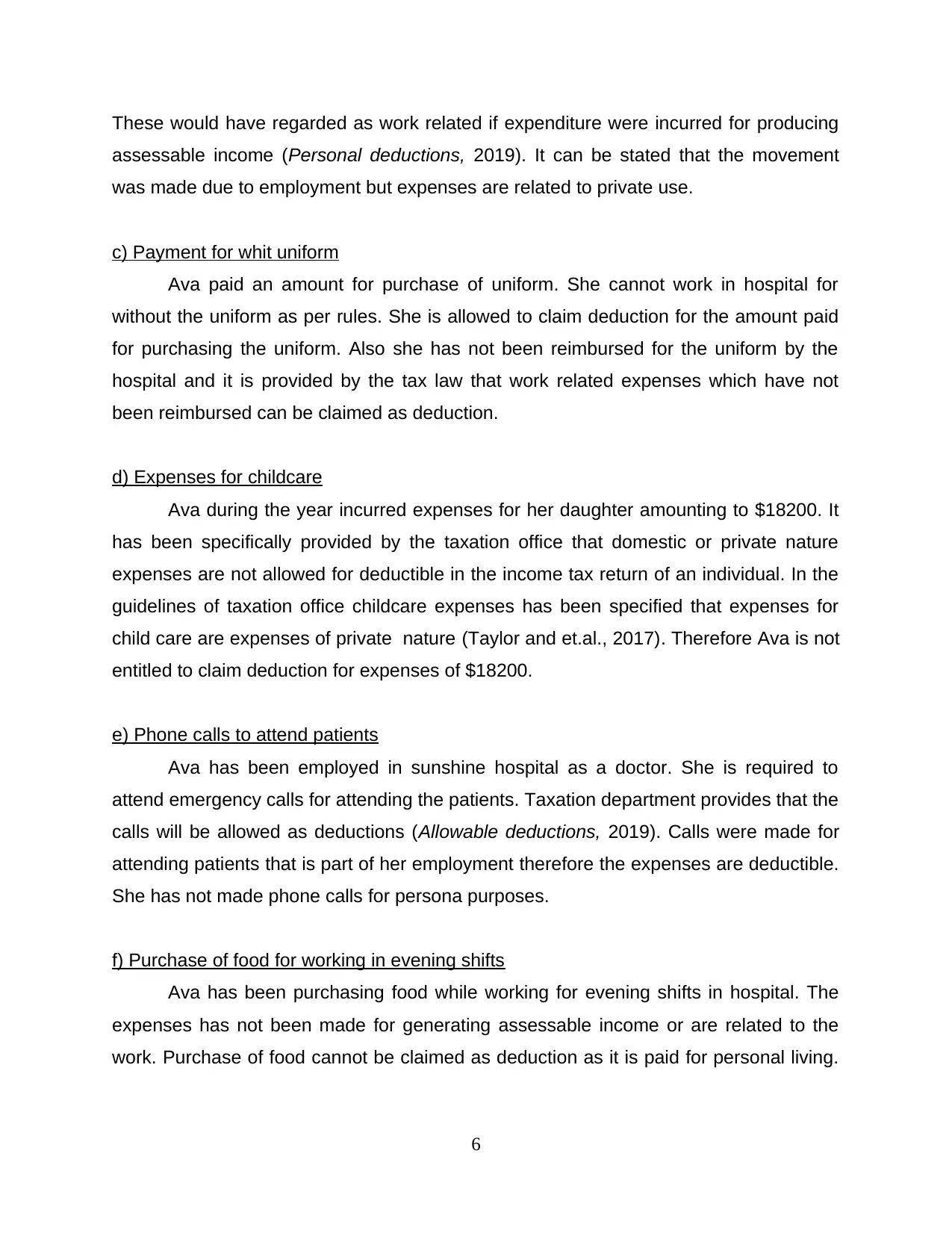
These would have regarded as work related if expenditure were incurred for producing
assessable income (Personal deductions, 2019). It can be stated that the movement
was made due to employment but expenses are related to private use.
c) Payment for whit uniform
Ava paid an amount for purchase of uniform. She cannot work in hospital for
without the uniform as per rules. She is allowed to claim deduction for the amount paid
for purchasing the uniform. Also she has not been reimbursed for the uniform by the
hospital and it is provided by the tax law that work related expenses which have not
been reimbursed can be claimed as deduction.
d) Expenses for childcare
Ava during the year incurred expenses for her daughter amounting to $18200. It
has been specifically provided by the taxation office that domestic or private nature
expenses are not allowed for deductible in the income tax return of an individual. In the
guidelines of taxation office childcare expenses has been specified that expenses for
child care are expenses of private nature (Taylor and et.al., 2017). Therefore Ava is not
entitled to claim deduction for expenses of $18200.
e) Phone calls to attend patients
Ava has been employed in sunshine hospital as a doctor. She is required to
attend emergency calls for attending the patients. Taxation department provides that the
calls will be allowed as deductions (Allowable deductions, 2019). Calls were made for
attending patients that is part of her employment therefore the expenses are deductible.
She has not made phone calls for persona purposes.
f) Purchase of food for working in evening shifts
Ava has been purchasing food while working for evening shifts in hospital. The
expenses has not been made for generating assessable income or are related to the
work. Purchase of food cannot be claimed as deduction as it is paid for personal living.
6
assessable income (Personal deductions, 2019). It can be stated that the movement
was made due to employment but expenses are related to private use.
c) Payment for whit uniform
Ava paid an amount for purchase of uniform. She cannot work in hospital for
without the uniform as per rules. She is allowed to claim deduction for the amount paid
for purchasing the uniform. Also she has not been reimbursed for the uniform by the
hospital and it is provided by the tax law that work related expenses which have not
been reimbursed can be claimed as deduction.
d) Expenses for childcare
Ava during the year incurred expenses for her daughter amounting to $18200. It
has been specifically provided by the taxation office that domestic or private nature
expenses are not allowed for deductible in the income tax return of an individual. In the
guidelines of taxation office childcare expenses has been specified that expenses for
child care are expenses of private nature (Taylor and et.al., 2017). Therefore Ava is not
entitled to claim deduction for expenses of $18200.
e) Phone calls to attend patients
Ava has been employed in sunshine hospital as a doctor. She is required to
attend emergency calls for attending the patients. Taxation department provides that the
calls will be allowed as deductions (Allowable deductions, 2019). Calls were made for
attending patients that is part of her employment therefore the expenses are deductible.
She has not made phone calls for persona purposes.
f) Purchase of food for working in evening shifts
Ava has been purchasing food while working for evening shifts in hospital. The
expenses has not been made for generating assessable income or are related to the
work. Purchase of food cannot be claimed as deduction as it is paid for personal living.
6
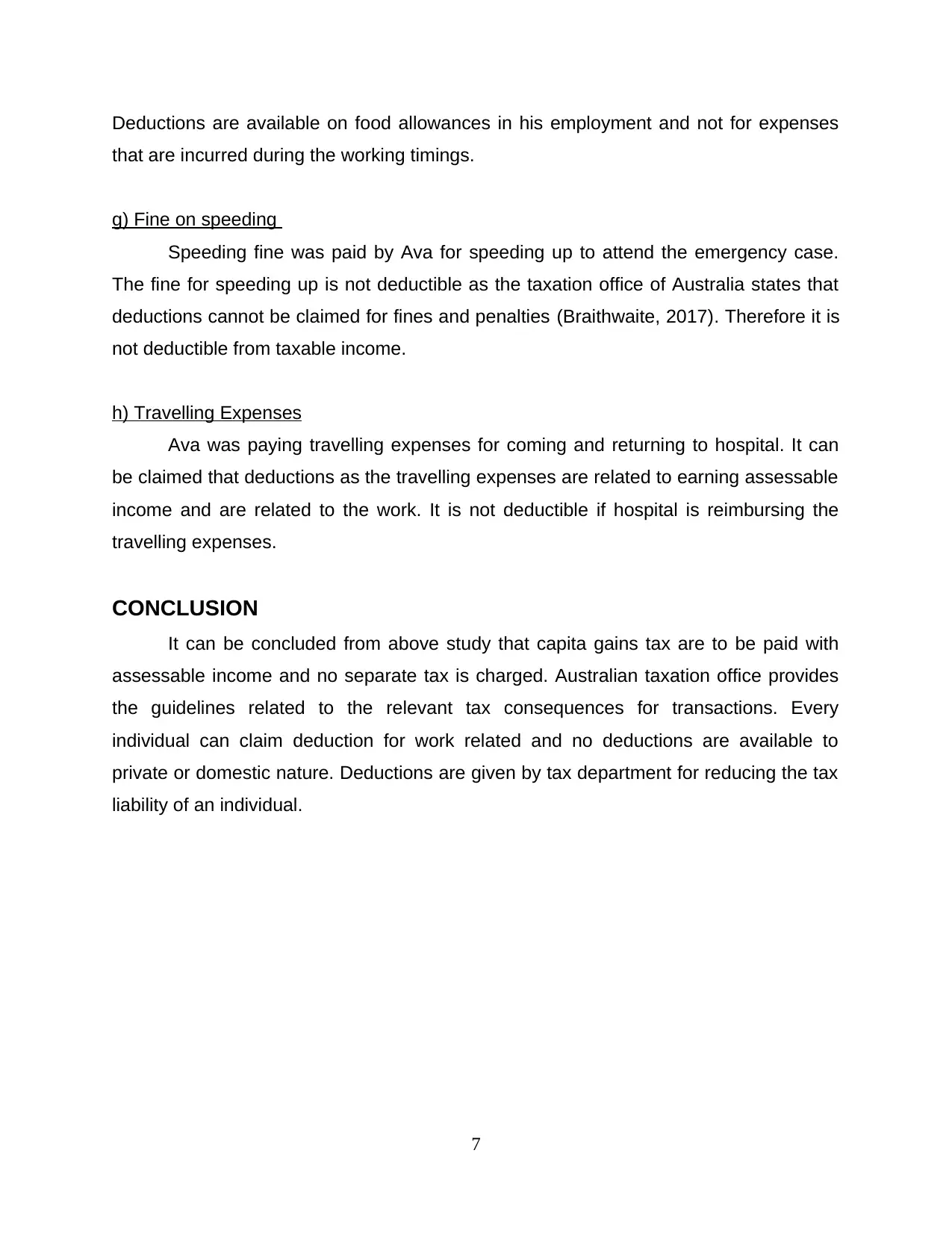
Deductions are available on food allowances in his employment and not for expenses
that are incurred during the working timings.
g) Fine on speeding
Speeding fine was paid by Ava for speeding up to attend the emergency case.
The fine for speeding up is not deductible as the taxation office of Australia states that
deductions cannot be claimed for fines and penalties (Braithwaite, 2017). Therefore it is
not deductible from taxable income.
h) Travelling Expenses
Ava was paying travelling expenses for coming and returning to hospital. It can
be claimed that deductions as the travelling expenses are related to earning assessable
income and are related to the work. It is not deductible if hospital is reimbursing the
travelling expenses.
CONCLUSION
It can be concluded from above study that capita gains tax are to be paid with
assessable income and no separate tax is charged. Australian taxation office provides
the guidelines related to the relevant tax consequences for transactions. Every
individual can claim deduction for work related and no deductions are available to
private or domestic nature. Deductions are given by tax department for reducing the tax
liability of an individual.
7
that are incurred during the working timings.
g) Fine on speeding
Speeding fine was paid by Ava for speeding up to attend the emergency case.
The fine for speeding up is not deductible as the taxation office of Australia states that
deductions cannot be claimed for fines and penalties (Braithwaite, 2017). Therefore it is
not deductible from taxable income.
h) Travelling Expenses
Ava was paying travelling expenses for coming and returning to hospital. It can
be claimed that deductions as the travelling expenses are related to earning assessable
income and are related to the work. It is not deductible if hospital is reimbursing the
travelling expenses.
CONCLUSION
It can be concluded from above study that capita gains tax are to be paid with
assessable income and no separate tax is charged. Australian taxation office provides
the guidelines related to the relevant tax consequences for transactions. Every
individual can claim deduction for work related and no deductions are available to
private or domestic nature. Deductions are given by tax department for reducing the tax
liability of an individual.
7
⊘ This is a preview!⊘
Do you want full access?
Subscribe today to unlock all pages.

Trusted by 1+ million students worldwide
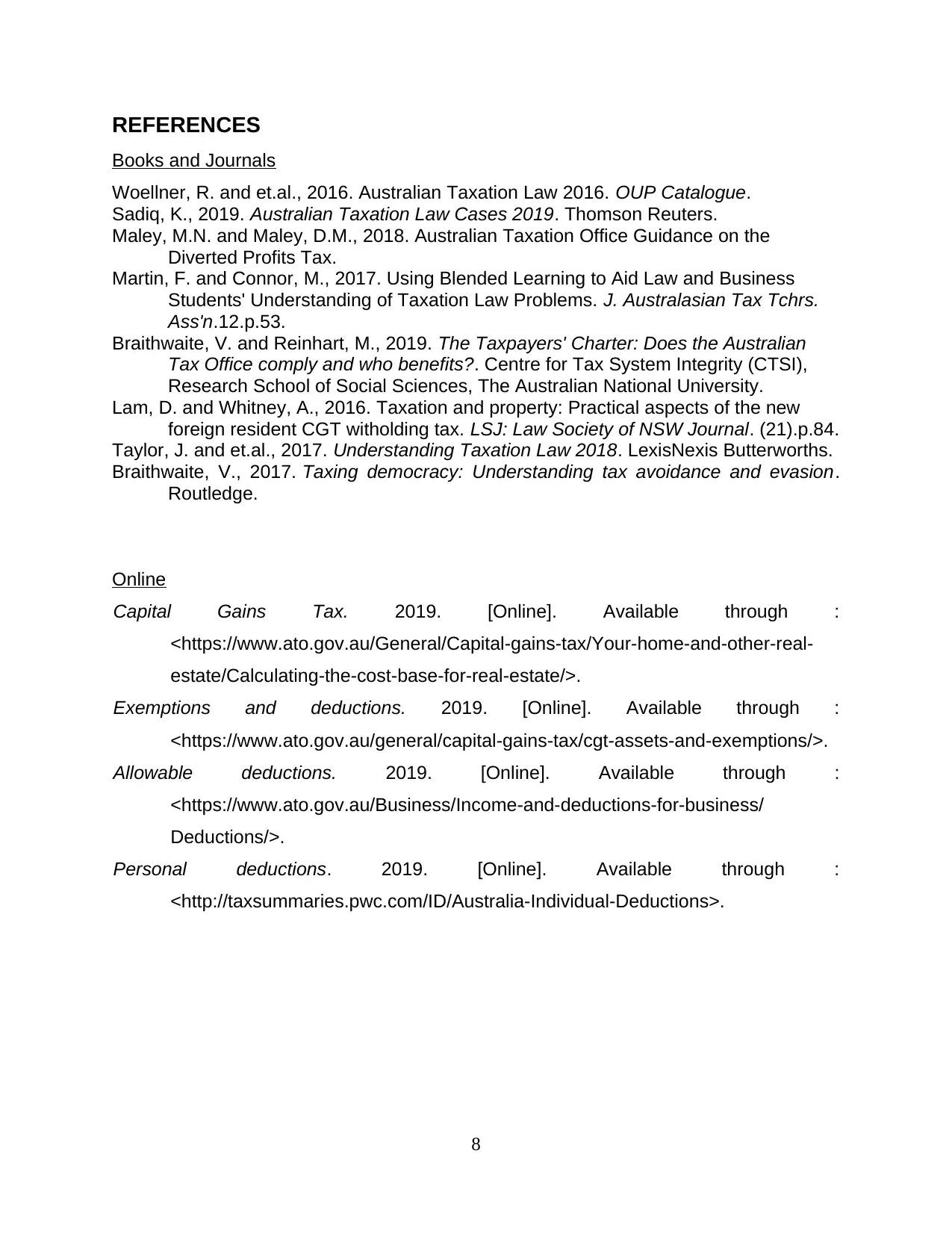
REFERENCES
Books and Journals
Woellner, R. and et.al., 2016. Australian Taxation Law 2016. OUP Catalogue.
Sadiq, K., 2019. Australian Taxation Law Cases 2019. Thomson Reuters.
Maley, M.N. and Maley, D.M., 2018. Australian Taxation Office Guidance on the
Diverted Profits Tax.
Martin, F. and Connor, M., 2017. Using Blended Learning to Aid Law and Business
Students' Understanding of Taxation Law Problems. J. Australasian Tax Tchrs.
Ass'n.12.p.53.
Braithwaite, V. and Reinhart, M., 2019. The Taxpayers' Charter: Does the Australian
Tax Office comply and who benefits?. Centre for Tax System Integrity (CTSI),
Research School of Social Sciences, The Australian National University.
Lam, D. and Whitney, A., 2016. Taxation and property: Practical aspects of the new
foreign resident CGT witholding tax. LSJ: Law Society of NSW Journal. (21).p.84.
Taylor, J. and et.al., 2017. Understanding Taxation Law 2018. LexisNexis Butterworths.
Braithwaite, V., 2017. Taxing democracy: Understanding tax avoidance and evasion.
Routledge.
Online
Capital Gains Tax. 2019. [Online]. Available through :
<https://www.ato.gov.au/General/Capital-gains-tax/Your-home-and-other-real-
estate/Calculating-the-cost-base-for-real-estate/>.
Exemptions and deductions. 2019. [Online]. Available through :
<https://www.ato.gov.au/general/capital-gains-tax/cgt-assets-and-exemptions/>.
Allowable deductions. 2019. [Online]. Available through :
<https://www.ato.gov.au/Business/Income-and-deductions-for-business/
Deductions/>.
Personal deductions. 2019. [Online]. Available through :
<http://taxsummaries.pwc.com/ID/Australia-Individual-Deductions>.
8
Books and Journals
Woellner, R. and et.al., 2016. Australian Taxation Law 2016. OUP Catalogue.
Sadiq, K., 2019. Australian Taxation Law Cases 2019. Thomson Reuters.
Maley, M.N. and Maley, D.M., 2018. Australian Taxation Office Guidance on the
Diverted Profits Tax.
Martin, F. and Connor, M., 2017. Using Blended Learning to Aid Law and Business
Students' Understanding of Taxation Law Problems. J. Australasian Tax Tchrs.
Ass'n.12.p.53.
Braithwaite, V. and Reinhart, M., 2019. The Taxpayers' Charter: Does the Australian
Tax Office comply and who benefits?. Centre for Tax System Integrity (CTSI),
Research School of Social Sciences, The Australian National University.
Lam, D. and Whitney, A., 2016. Taxation and property: Practical aspects of the new
foreign resident CGT witholding tax. LSJ: Law Society of NSW Journal. (21).p.84.
Taylor, J. and et.al., 2017. Understanding Taxation Law 2018. LexisNexis Butterworths.
Braithwaite, V., 2017. Taxing democracy: Understanding tax avoidance and evasion.
Routledge.
Online
Capital Gains Tax. 2019. [Online]. Available through :
<https://www.ato.gov.au/General/Capital-gains-tax/Your-home-and-other-real-
estate/Calculating-the-cost-base-for-real-estate/>.
Exemptions and deductions. 2019. [Online]. Available through :
<https://www.ato.gov.au/general/capital-gains-tax/cgt-assets-and-exemptions/>.
Allowable deductions. 2019. [Online]. Available through :
<https://www.ato.gov.au/Business/Income-and-deductions-for-business/
Deductions/>.
Personal deductions. 2019. [Online]. Available through :
<http://taxsummaries.pwc.com/ID/Australia-Individual-Deductions>.
8
1 out of 10
Related Documents
Your All-in-One AI-Powered Toolkit for Academic Success.
+13062052269
info@desklib.com
Available 24*7 on WhatsApp / Email
![[object Object]](/_next/static/media/star-bottom.7253800d.svg)
Unlock your academic potential
Copyright © 2020–2026 A2Z Services. All Rights Reserved. Developed and managed by ZUCOL.



